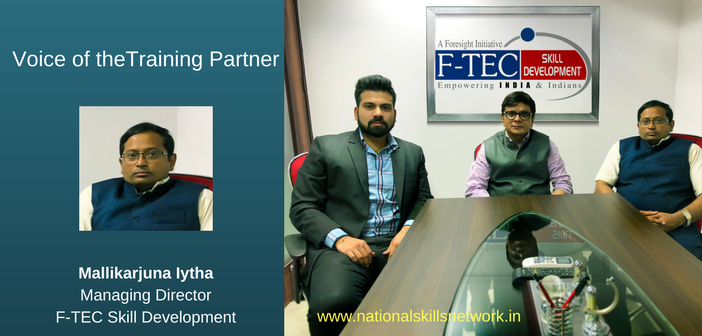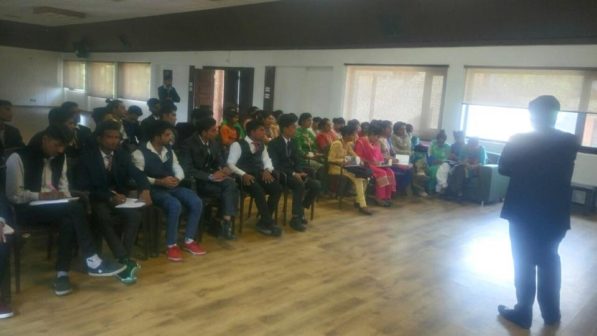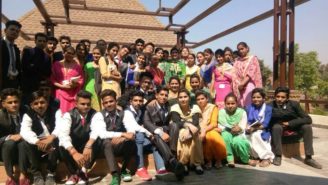Mallikarjuna Iytha, Managing Director, F-TEC Skill Development, makes a case for employability and promotion of aspirational value of skills
 F-TEC has been into skill-based training for 22 years, running various fee-based courses. We have created a social enterprise model, making our courses affordable to all sections of society.
F-TEC has been into skill-based training for 22 years, running various fee-based courses. We have created a social enterprise model, making our courses affordable to all sections of society.
We’ve trained more than 4 lakh youth from marginalized communities, dropouts, lower middle class, encouraging them to get skilled and get into entry level jobs. We also implement government schemes like PMKVY, thus covering the entire ecosystem, starting from school level to other NSQF-compliant courses like B.Voc, besides executing state skill missions projects like SuryaMitra with RSLDC. For the last one decade, our mandate has been to be make our students digitally empowered. They even have to make their families digitally literate with the project work we assign to them. Digital skills are an integral part of our courses.
What is your perception of private participation in making vocational education and training a success in India?
Public-private collaboration is very much needed. I would insist on exploring public institutions like Railways and others for making use of their infrastructure and domain expertise. There is lot of infrastructure available in our country, with several schools and colleges that can partner in expanding outreach and delivering quality. Today, training partners have to perform every activity in the skilling process from A to Z, like mobilization, placement and monitoring. With strategic public collaboration, there could be better sharing of roles and responsibilities.

What are the challenges faced when implementing training programmes and how can we overcome them?
We need a strategy to match aspirations of the youth with what is available in the job market. We are creating aspirational training centres. However, the aspirations of the youth and the change in mindset are the biggest challenge. We are assuming skill development is aspirational, but we are not trying to understand what their individual aspirations are. Studies on aspirations of rural and urban youth have shown some alarming results. The youth want a starting salary of Rs. 15000, but are offered Rs. 8000; the gap of Rs. 6000 is huge, hence they dropout. We need to understand why they want Rs. 15000 as salary even though five years down the line, if they want to earn Rs. 20000, it could be achievable as part of the career progress. Convincing them to start with Rs. 10000 and then moving upwards is the biggest challenge. The market is not willing to pay higher and we need to resolve this issue.
Are you satisfied with skill development at higher level job roles?
 I would say, recognition of the skills certificate is a major issue. Industry wants to recruit skilled workers, but when it comes to higher salary, the value of the certification comes into question. Though we have been articulating it, we haven’t popularized the value of skills. In most cases, the skill-certified person and the non-skilled get the same salary, even at higher level, be it the master craftsman, or master trainer. Apparently, because of certification, the candidates are able to get jobs at the entry level, but not sure if they are able to move higher due to this certificate. This is yet to be validated.
I would say, recognition of the skills certificate is a major issue. Industry wants to recruit skilled workers, but when it comes to higher salary, the value of the certification comes into question. Though we have been articulating it, we haven’t popularized the value of skills. In most cases, the skill-certified person and the non-skilled get the same salary, even at higher level, be it the master craftsman, or master trainer. Apparently, because of certification, the candidates are able to get jobs at the entry level, but not sure if they are able to move higher due to this certificate. This is yet to be validated.
With regard to B.Voc courses, in Pune, we are running two courses in Beauty and Wellness and Mass Communication. The first year was quite a challenge with just 54 students and there was confusion regarding university recognition, SSC onboarding etc. Now we have 156 students and and it is self-sustainable with students paying their own fee. In this case too, the mindset of the youth regarding skill certification is not very high. I hope when they get the final dual degree, there should be a change in their perceptions. We consider B.Voc as a successful model in Mass Communication, however in Beauty and Wellness it had a mixed response.
What are the two things you wish to change in the evolving vocational training landscape?
Here’s my first concern. Present skilling system is definitely needed and well-articulated going by the present day market demands. However, it needs effective implementation on the ground, for example, in making NSQF courses mandatory since on ground awareness about it is very less. The second point is about making skilling aspirational, going beyond mobilizing people into the training center. We’ve observed that after training, majority are not willing to take up employment for several reasons. Unless we ensure respect of skills, the impact of training will not translate into job retention in the available job roles.
There needs to be better advocacy with stories around trades and skills. If there is no respect for plumbing in this country, nobody would like to become a plumber. If a course on plumbing course can drive aspirational value, it should also get translated into attracting youth in the job market. This respect could come from better salaries or with higher level courses like Bachelors and Masters degrees in Plumbing recognized on par with academic stream.
What is your advice to new entrepreneurs in training for vocational skills?
 The slogan for Skill India has been ‘Skill, Scale and Speed’; to this, I would like add another ‘S’ in with Social Impact. Skilling needs to be perceived as a part of the integrated system, it can’t be done only for business reasons. There should be conviction and commitment from every entrepreneur that are creating a better future through social impact within certain ethical parameters. They need to diversify and not depend on government projects alone. Diversification is also needed through self-funding, long term industry-led programs and those that address the local needs. They should not think that solely with government funds, they can build a training company. For instance, there may be government funding for Level 4 short term courses, but who will support Level 5, 6 or 7 for which there exists a huge market. There is scope for entrepreneurship in rural areas too, they need to leverage rural networks.
The slogan for Skill India has been ‘Skill, Scale and Speed’; to this, I would like add another ‘S’ in with Social Impact. Skilling needs to be perceived as a part of the integrated system, it can’t be done only for business reasons. There should be conviction and commitment from every entrepreneur that are creating a better future through social impact within certain ethical parameters. They need to diversify and not depend on government projects alone. Diversification is also needed through self-funding, long term industry-led programs and those that address the local needs. They should not think that solely with government funds, they can build a training company. For instance, there may be government funding for Level 4 short term courses, but who will support Level 5, 6 or 7 for which there exists a huge market. There is scope for entrepreneurship in rural areas too, they need to leverage rural networks.
Our focus should be on employability rather than employment. We cannot create a team of skilled, unemployed people. Being multi-skilled is the market demand though we need specialized courses at level 7. An apprentice under a master carpenter needs to know many skills to stay relevant. A study has found that only 20% of the ITI diploma holders are employable. Employability has to be a concern for academic institutions as well.













